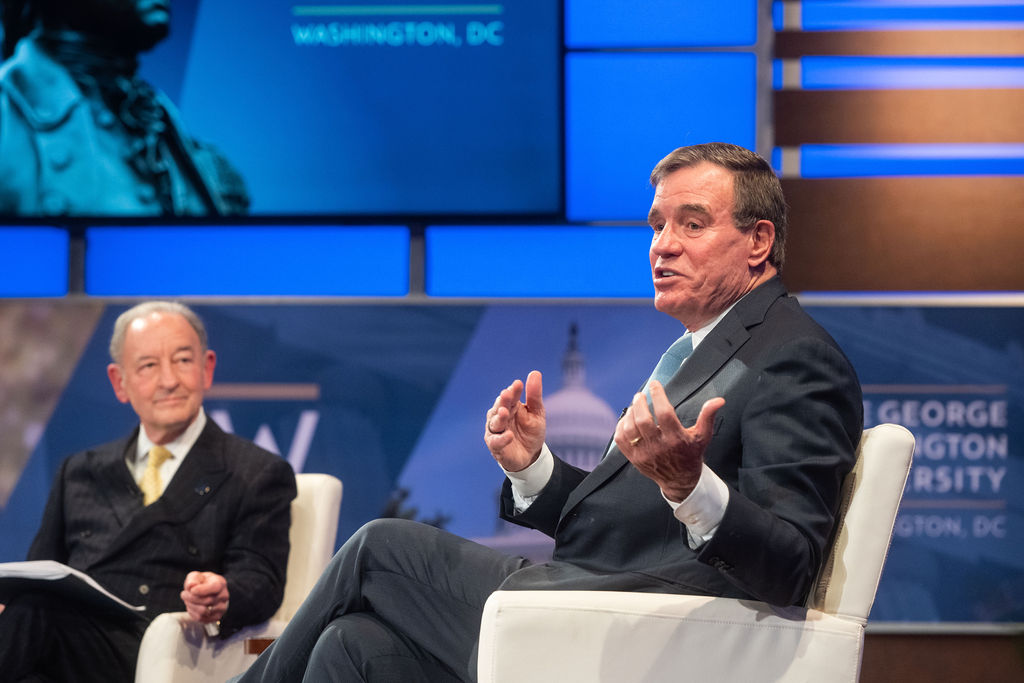Cybersecurity and privacy threats are the number one threat to the global economy, as the cost of cybercrime is projected to grow to $10.5 trillion by 2025. To examine emerging cybersecurity threats affecting national security and resulting in this high cost for businesses, the inaugural GW Business & Policy Forum: Attacking Cybersecurity Risks was held on April 25. This forum was a collaborative effort between the GW’s School of Business, School of Engineering and Applied Science, College of Professional Studies and Law School.
To kick off the forum, President Mark S. Wrighton provided opening remarks: “Cybersecurity is an urgent need for every organization and every person in our society. This forum is unique because it brings together voices from many sectors.”
The forum brought together global leaders from both the public and private sectors. Speakers from both sectors emphasized the importance of public-private partnerships in each session. Kent Walker, President of Global Affairs at Google and Alphabet, began the conversation on this theme: “Industry has been reactive, but we can’t wait since the threat landscape is evolving quickly. The size of the investment, expertise, and framework needed to advance artificial intelligence (AI) makes it necessary for public-private partnerships.”
The U.S. government’s newly released National Cybersecurity Strategy addresses this need by creating a regulatory structure that supports the development of America’s cyberdefense infrastructure.
“The national cybersecurity framework is trying to get companies at all levels to a base point where they are resilient against cyberattacks and have a regulatory network to rely on,” said Phyllis Schneck, Vice President and Chief Information Security Office for Northrop Grumman.
Regarding AI-powered cybersecurity, Julian Zottl, Chief Technology Officer for Cyber Protection Solutions at Raytheon Technologies, had this to say “Cyber threats are now using AI to attack. Thus they are attacking us at machine speeds and you can’t fight that with people. We have to automate what we’re doing to find the bad actors at the speed they’re working at.”
Attackers currently have a clear advantage when using AI to search for cyber vulnerabilities. Thus, another key theme of the forum was cultivating better defense AI programs. Robert Cunningham, Ph.D., Vice Chancellor for Research Infrastructure at the University of Pittsburgh, discussed quantum computing as an additional area to help strengthen defense against cyberattacks. Quantum computing needs much more research. However, it has the same potential to make the standard organizational cyber infrastructure more well-equipped for faster and more robust responses as AI and machine learning.
The Honorable Senator Mark Warner spoke primarily about the last theme seen at the forum, ensuring security is built into the framework of AI itself.
“What got me interested in the Internet of Things (IoT) was the fact that we were heading down this road where technology will be in all aspects of our lives, but they do not have a built-in cybersecurity framework,” said Senator Warner.
A built-in cybersecurity framework is another area that the National Cybersecurity Strategy touches on. Public perception of AI is overall cautious, however Adam Mattina, Managing Director and Portfolio Chief Information Security Officer (CISO) at Blackstone, noted that only about 5% of companies use AI or are in the implementation phase. The national strategy looks for greater accountability for building security in software products and new information and data-sharing structures, which may help ease public concerns.
Many parts of the national cybersecurity strategy will not happen overnight because more research is needed. Panelists emphasized university students’ role in researching to further these areas of cybersecurity defense. Hans Vestberg, CEO of Verizon, tasked students with researching tough subjects such as privacy and trustworthy AI. Current GW Engineering students showcased their research on these topics and more at a networking reception that followed the closing keynote.
The GW Business and Policy Forum: Attacking Cybersecurity Risks addressed common concerns surrounding the future of cyber security while also instigating more questions amongst attendees about what role they will each play in this fast-changing field. GW hopes that the forum inspires attendees to continue collaborating on new technologies and acting to manage cyber risks while keeping the impactful comments made throughout the day in mind.



